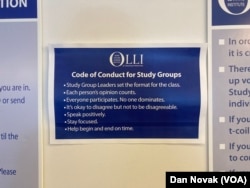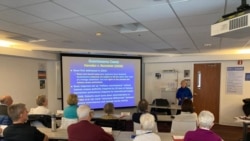For those attending classes at the Osher Lifelong Learning Institute (OLLI) in Washington, D.C., retirement is not a time to slow down. And it surely is not a time to stop learning.
OLLI, which is on the grounds of American University (AU), offers classes especially for retirees. The institute has more than 90 classes each semester and has about 1,600 members, or students. It costs just $300 per semester or $550 for the spring and autumn semesters.
OLLI offers its members classes in 10 different fields. The courses for this spring include the History of Slavery in America, the Ancient Mediterranean, Color Theory, Play Writing, and The Ups and Downs of Weather. Classes meet once a week for seven to 10 weeks.
“I think the typical OLLI members … were the kids who were most excited about school,” said Tony Long, OLLI’s executive director. “They love education. They love learning. And these are people who, for the most part, retired at the height of their respective professions.”
OLLI at AU is one of 125 Osher Lifelong Learning Institutes on college campuses nationwide. The programs started back in 2001 with financial support from businessman Bernard Osher’s foundation. And in 2008, the Osher Foundation provided a $200,000 gift to create OLLI at AU.
OLLI at AU is considered to be the most demanding program in the country, Long said.
Much of it has to do with the OLLI membership in Washington, D.C. said Penny Hansen. She has taught a course at OLLI on the Supreme Court for several years. The nation’s capital is known as a city with many knowledgeable people in law, politics, public policy and media.
“A lot of people retire in Washington and just stay here,” Hansen said. “They really like it here because it's a stimulating environment here.”
Unlike some teachers at OLLI, Hansen had no official teaching experience before OLLI. She also does not have a law background. But she spent 30 years at the Environmental Protection Agency, helping carry out the agency’s programs. Hansen said she became very interested in the Supreme Court after retiring, and after taking classes at OLLI for a few years, decided to teach one.
“I did not know… 80 percent of what I'm teaching now when I started out in OLLI,” she said. “What I bring to this is the larger view of being… out in the world and understanding government and how people view and approach government.”
She said she prepares for her classes, which are largely about recent Supreme Court cases, by reading many books and reports. This semester, there are seven lawyers taking the class. The class is not designed for people with a strong legal background. But Hansen said it does not bother her that there may be people taking her class who know the subject better than she does.
Kevin Mills is a recently retired business lawyer in Hansen’s class. He said he had long been interested in issues of constitutional law, but “I didn’t really have the time to focus on it as much as I do now.” He added, “I can dig deeper now that I have more time.”
Long said that at OLLI, the relationship between student and teacher is more equal than at a traditional school.
The idea is that “everybody who comes into the room has knowledge and experience,” he said. “It's going to add to the classroom discussion. Throw that in with no grades or test, and it's a good combination for taking classes.”
Sarah DeCarlo was taking the class on the Supreme Court for the second time. “My degree was in speech pathology, so I didn’t get a chance to take a lot of these liberal arts courses,” she said. At OLLI, she has taken classes on music, movies and history. “When do you get a chance to do that?” she asked.
DeCarlo attended the class with her friend Marysue Flanagan, whom she recently persuaded to join.
Flanagan said she had previously audited classes at a different university and greatly enjoyed the experience of being with younger college students. Auditing means attending a class but not for credit.
But she said to take a class with the experience of someone like Hansen, “and with your contemporaries is just a totally different dynamic.”
I'm Dan Novak.
And I'm Faith Pirlo.
Dan Novak wrote this story for VOA Learning English.
__________________________________________________________________
Words in This Story
semester — n. one of two usually 18-week periods that make up an academic year at a school or college
respective — adj. belonging or relating to each one of the people or things that have been mentioned
foundation — n. an organization that is created and supported with money that people give in order to do something that helps society
stimulating — adj. exciting or interesting
view — n. an opinion or way of thinking about something
approach — n. to begin to deal with or think about
focus — n. a main purpose or interest
grade — n. a number or letter that indicates how a student performed in a class or on a test
speech pathology — n. the study and treatment of speech and language problems
liberal arts — n. areas of study that are intended to give you general knowledge rather than to develop specific skills needed for a profession
contemporary — n. a person who lives at the same time or is about the same age as another person
dynamic — n. the way that two or more people behave with each other because of a particular situation
"Stop" - Google News
March 26, 2023 at 05:01AM
https://ift.tt/UOiMXmP
For Some Retirees, It’s Not Time to Stop Learning - VOA Learning English
"Stop" - Google News
https://ift.tt/Vv0kQy8
https://ift.tt/AcPTXgy
Bagikan Berita Ini

















0 Response to "For Some Retirees, It’s Not Time to Stop Learning - VOA Learning English"
Post a Comment